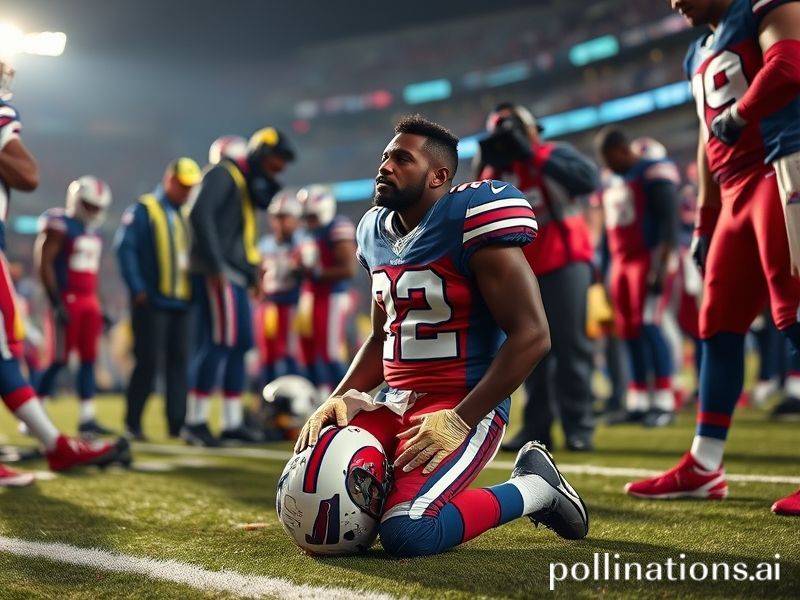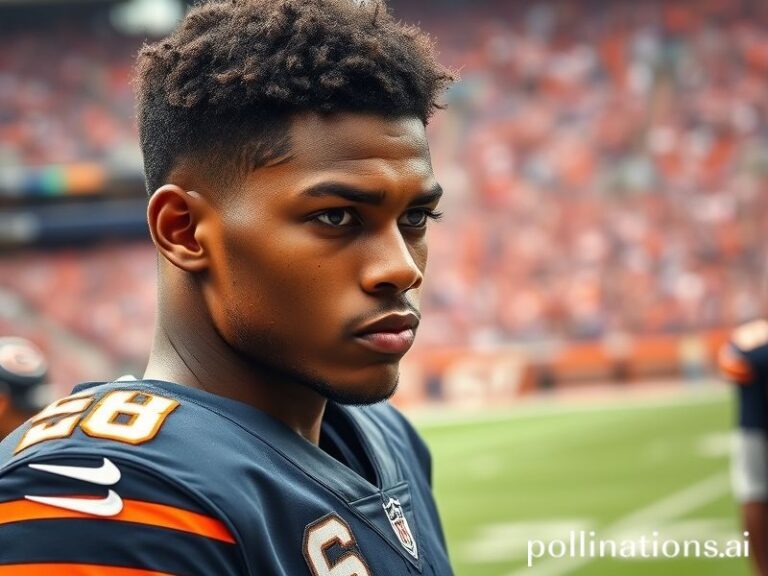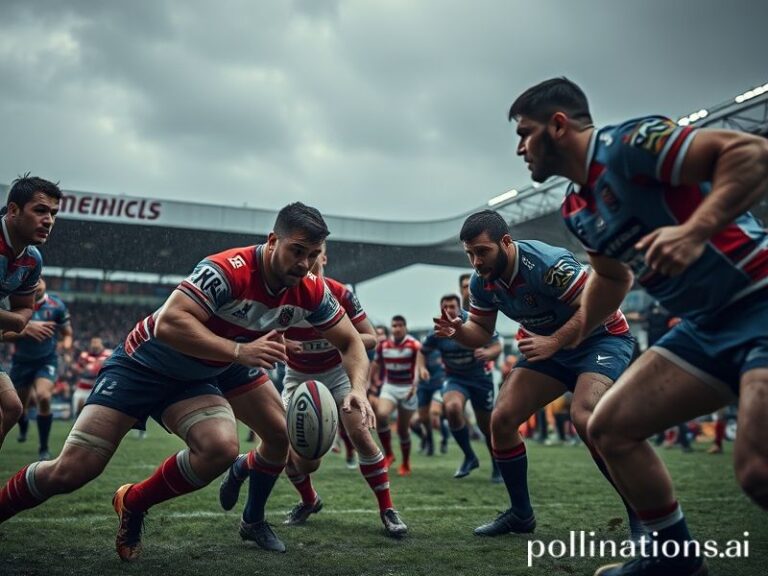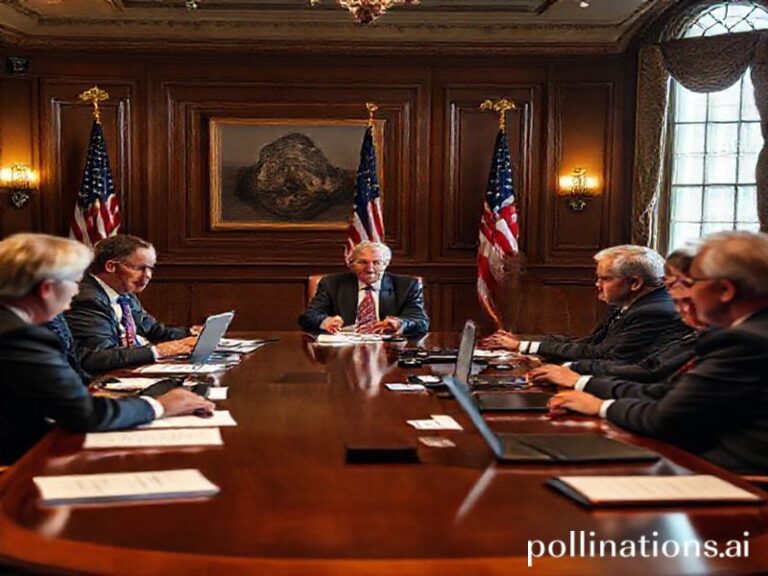When Damar Hamlin’s Heart Stopped, the World’s Started: A Global Playbook on Cardiac Arrest, Capitalism, and Communal Panic
Buffalo, New York – The moment Damar Hamlin’s torso hit the turf at Highmark Stadium, the world’s collective attention dropped faster than the Dow on a Federal Reserve tantrum. From Lagos to Lisbon, smartphones pinged with push alerts like a synchronized fire drill, proving once again that nothing unites humanity quite like televised cardiac arrest. The NFL’s Monday Night game became the planet’s Tuesday-morning water-cooler moment, reminding us that the most American of pastimes travels faster than a European energy crisis.
Overnight, Hamlin morphed from an undrafted second-year safety into the most famous American export since the Kardashians—minus the perfume line. Hashtags in Arabic, Korean, and Portuguese trended simultaneously, as if the United Nations had finally discovered a universal language: #PrayForDamar. Even the Kremlin’s propaganda channels paused their usual “everything is NATO’s fault” programming to air footage of the Bills’ medical staff, presumably so Russian viewers could compare defibrillator response times with battlefield medevacs.
The irony, of course, is delicious. A league whose global marketing strategy has long been “bigger shoulder pads mean bigger ratings” suddenly found itself the unwitting star of a public-health PSA. Within minutes, the NFL International Series—those annual London games where confused Brits pretend to enjoy commercial breaks—was re-branded by Twitter as the “NFL Cardiology Series.” Sales of automated external defibrillators on Amazon’s UK site spiked 500 percent, proving that nothing boosts consumer demand like existential dread wrapped in prime time.
Meanwhile, the European Union—never one to miss a regulatory opportunity—began drafting guidelines for “televised sporting resilience,” a phrase so bureaucratically bland it could only have been born in Brussels. The proposal, leaked to Der Spiegel, suggests mandatory cardiologists on every sideline, plus a minimum ratio of one ambulance per million viewers. Naturally, FIFA is watching closely, calculating how to monetize the spectacle; rumor has it Infantino wants to add “sudden-death overtime” to the Laws of the Game, just to keep the brand consistent.
In parts of Africa where gridiron remains as foreign as snowplows, Hamlin’s collapse still resonated. Lagos radio hosts debated whether American football’s padded gladiators are braver than local footballers who play for wages paid in “exposure.” One caller noted that if a Nigerian Premier League player went into cardiac arrest, the nearest defibrillator would probably be in Dubai. Gallows humor travels well when the power grid is unreliable.
Asia offered its own spicy takes. Chinese state media framed the incident as proof of Western “toxic athleticism,” contrasting it with the nation’s supposedly heart-friendly ping-pong regimen. Meanwhile, South Korean netizens—world champions of empathy and live-tweeted outrage—meme-ified the Bills’ medical team into K-pop idols, complete with fan cams and light-stick choreography. Somewhere in Seoul, a startup is already prototyping a “Damar Oppa” NFT that promises to donate 3 percent of proceeds to charity, minus blockchain fees, naturally.
Back in the United States, politicians who can’t agree on the time of day managed bipartisan tweets faster than you can say “midterm optics.” Biden invoked Hamlin in a speech about healthcare access; Trump, never one to miss a ratings opportunity, hinted he’d have resuscitated Hamlin “bigger and better, believe me.” Cable news booked cardiologists like they were Marvel spin-offs—Dr. Oz even returned from his failed Senate run for a cameo, reminding viewers that some arrhythmias are more electable than others.
And yet, beneath the cynical circus lies a stubbornly human pulse. Crowdfunding for Hamlin’s toy-drive charity crashed the web portal, not from Russian hackers but from sheer global generosity. ICU waiting rooms from Toronto to Tokyo received flowers ordered by strangers who couldn’t find Buffalo on a map. For one surreal week, the planet’s most polarized species agreed on a single sentence: Let the kid breathe.
Conclusion: Damar Hamlin’s heart stopped, but the world’s never beat louder. In an era when we can’t agree on climate, tariffs, or which billionaire gets to colonize Mars, we somehow synchronized our own cardiac rhythms to a 24-year-old safety’s. The NFL will keep selling Sunday packages in 190 countries, and we’ll keep pretending that 300-pound men colliding at car-crash speeds is just harmless fun. But for 360 frozen seconds on a January night, every cynical heart on Earth skipped the same beat—and, against all odds, started again.







